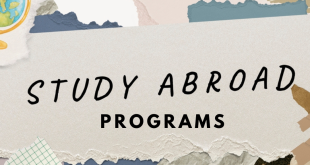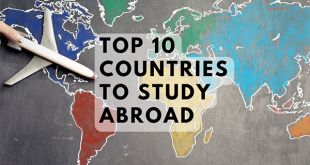Studying abroad is a transformative experience that will broaden your horizons in ways you never imagine. It offers the opportunity to immerse yourself in a new culture, gain a global perspective, and develop skills that will serve you throughout your life. However, it comes with its set of challenges that can be daunting for even the most adventurous students. From adapting to a new culture to battling homesickness and staying on top of academic demands, navigating these obstacles is essential for a successful study abroad journey. This article aims to address these common challenges and provide practical advice and strategies for a successful study abroad experience.
Table of Contents
The Benefits of Studying Abroad
Leaving one’s home country to pursue higher education in a foreign land is a decision that involves careful planning and consideration. This includes academic goals, personal growth and cultural enrichment. Before addressing the challenges, let’s talk first about the main reasons international students choose to study abroad.
Studying abroad involves more than just getting a degree from an international institution. It’s an immersive experience that not only opens the door to global career opportunities, it also fosters personal development and enhances cultural awareness. Recognizing the importance of this journey on these levels is crucial in overcoming the challenges that come with it.
Firstly, it provides opportunities for cultural immersion, enabling students to deeply engage with the customs and traditions of their host country. This immersive experience fosters intercultural competence and global perspective. Secondly, students pursuing academic success get access to top-tier higher education institutions abroad. And many of them often have unique program offerings that are not available in the students’ home countries.
Additionally, living in a foreign country is a surefire way to enhance language proficiency, as daily interaction with native speakers promotes language immersion and fluency. The fourth reason has to do with students’ future career prospects.
Through the international experience they get when studying abroad, students set themselves apart once they get in the job market. And this thanks to the adaptability, resilience and global perspective they develop during their journey abroad.
Lastly, on a personal level, studying abroad encourages personal growth by challenging students to step out of their comfort zone. This helps fostering independence and building self-confidence. In sum, studying abroad is a life-enriching journey that encompasses academic, cultural, and personal development.
Challenges Faced by International Students Abroad
International students may encounter a myriad of challenges that can affect various aspects of their lives abroad. This includes academics, culture and social interactions, finances, visa, health concerns and more.
However, through implementing the right strategies, you can make your time abroad a successful and memorable one. Let’s start by dissecting each of these challenges before we delve into the ways to tackle them head-on.
Academic Challenges
Studying abroad often means adapting to a new educational system, which can be vastly different from what students are accustomed to in their home countries. These academic challenges are both exciting and daunting.
Adapting to a New Educational System
One of the primary academic challenges faced by international students is adjusting to a new educational system. Each country has its own teaching methodologies, grading systems, and classroom expectations. This transition can be overwhelming, as students must quickly adapt to a different learning environment.
Language Barriers that can Thwart Your Academic Performance
Language is a critical factor in academic success abroad. Many international students grapple with language barriers, which can affect their ability to comprehend lectures, participate in discussions, and excel in assignments and exams.
Differences in Grading and Evaluation
Grading systems can vary significantly from one country to another. Understanding how grades are awarded and the criteria for evaluation is crucial for international students to set realistic academic goals and expectations.
Tips to Overcome Academic Challenges When You Study Abroad
Each educational system has its own set of standards and expectations. Therefore, to succeed academically:
- Research thoroughly before departure. Make sure you understand the grading system, coursework expectations, and study methods of your host country.
- Once in class, don’t hesitate to communicate with professors and seek clarification on coursework expectations.
- Additionally, you can use academic resources like tutoring centers and writing labs to improve your skills.
Navigating a New Culture
Moving to a foreign country brings about a host of cultural challenges. These challenges often manifest as cultural shock, stereotypes, and difficulties in communication.
Cultural Shock And Adjustment
Culture shock is a common phenomenon among international students. It refers to the feeling of disorientation and discomfort when exposed to a new culture. Adjusting to different norms, traditions, and social expectations can be a gradual process.
Dealing with Stereotypes and Prejudices
Stereotypes and prejudices can hinder the integration of international students into their host communities. And overcoming these stereotypes and fostering understanding between cultures is essential for a positive study abroad experience.
Cultural Differences in Communication
Effective communication is crucial in any academic setting. International students must learn to navigate cultural differences in communication styles to succeed in their studies and social interactions. This can be non-verbal cues, body language, and tone.
Tips to Embrace Cultural Diversity
One of the most enriching aspects of studying abroad is the exposure to diverse cultures. To overcome this challenge:
- Engage actively and participate in cultural events, festivals, and local traditions. Immerse yourself in the local way of life.
- Learn the language, even basic language skills can go a long way in building connections and understanding your surroundings.
- Cultivate an open mind to different viewpoints and practices. Furthermore, avoid making hasty judgments.
Dealing with Homesickness and Other Social Challenges
Building a social network in a foreign country, coping with homesickness, and maintaining a balance between social life and academics are among the social challenges faced by international students.
Building a Social Network In A Foreign Country
Creating a support system and making friends in a new country can be challenging. International students often find themselves in a position where they need to step out of their comfort zones to build meaningful social connections.
Coping with Homesickness
Being away from home for an extended period can be emotionally taxing. It’s common to miss family, friends, and the familiar comforts of home. Understand that homesickness is normal, and it will gradually lessen as you settle in.
Balancing Social Life and Academics
Achieving a balance between a vibrant social life and academic commitments can be tricky. It’s essential for students to manage their time effectively to make the most of their study abroad experience.
Social Integration Tips for International Students Abroad
Building a support system is crucial for social integration and managing homesickness. Here are some ways you can overcome this type of challenges when you study abroad:
- Stay connected and keep in touch with family and friends through video calls, emails, and social media.
- Create a home away from home. You can do so through personalizing your living space with familiar items.
- Explore your host city and dive into local activities. Moreover, you can explore your surroundings to create new, positive experiences.
Overcoming Financial Challenges During Your Study Abroad Journey
Finances play a significant role in the study abroad journey. Managing tuition fees, living expenses, and currency exchange are common financial challenges.
Managing Tuition And Living Expenses
Studying abroad often comes with a hefty price tag. Managing tuition fees and covering living expenses can be a financial juggling act for international students.
Currency Exchange and Banking Issues
Navigating currency exchange rates and international banking systems can be confusing. It’s then crucial to have a clear understanding of these financial aspects to avoid unexpected costs and financial pitfalls.
Financial Planning: Budgeting Tips for Study Abroad
Financial planning is crucial to ensure a stress-free study abroad experience. To do so:
- Create a budget. Estimate your expenses, including tuition, housing, food, transportation, and leisure activities.
- Explore scholarship and grant opportunities specifically for study abroad students.
- If allowed by your visa, consider part-time work to supplement your finances. Needless to say, make sure to balancing work hours with your academic commitments. It is essential to ensure that studies are not compromised.
Visa and Immigration Challenges and Legal Issues
Visa and immigration-related challenges are a significant aspect of your study abroad journey. The complex visa application process, immigration regulations, and compliance requirements can quickly become overwhelming.
Visa Application Process and Documentation
Obtaining a student visa often involves a detailed application process, requiring various documents, such as acceptance letters, financial statements, and passport details.
Immigration Regulations and Compliance
International students must adhere to the immigration regulations of their host country. Understanding and complying with these rules is thus essential to maintain legal status.
Visa Renewal and Extension Issues
For students planning to extend their stay or renew their visas, navigating the renewal process and meeting the requirements can be a bureaucratic challenge.
Avoid Visa and Legal Issues Abroad
Navigating visa requirements and adhering to immigration laws can be a complex process. Failure to comply can lead to legal troubles and potential deportation. Here’s how to avoid any problems:
- Familiarize yourself with the visa requirements and immigration laws of your host country.
- Seek guidance from your university’s international student office for visa-related concerns.
- Always carry essential documents, such as your passport and visa, securely.
Health and Wellness Challenges When You Study Abroad
Ensuring access to healthcare in a foreign country, dealing with physical and mental health issues, and understanding health insurance options are vital for international students’ well-being.
Access to Healthcare in a Foreign Country
Access to healthcare services may differ significantly from one country to another. International students need to be aware of the healthcare options available to them.
Dealing With Physical and Mental Health Issues
Physical and mental health issues can arise during the study abroad journey. Knowing where to seek help and support is crucial for overall well-being.
Understanding Health Insurance Options
Health insurance is a critical aspect of international student life. Being that, understanding the terms of coverage and where to seek medical assistance is essential for a stress-free experience.
Health and Safety Abroad: Staying Healthy and Safe
Maintaining your well-being is a top priority when studying abroad. Therefore, it’s essential you:
- Ensure you have adequate health insurance coverage.
- Get the necessary vaccinations before traveling.
- Get familiar with the local emergency numbers and have emergency contact information for your embassy or consulate abroad.
Housing Challenges Abroad
Finding suitable accommodation, dealing with landlords, and understanding rental contracts are essential aspects of settling into a new environment.
Dealing with Landlords and Rental Contracts
Navigating rental agreements and dealing with landlords can be complex, especially when there are language barriers and different legal norms.
Safety and Security Concerns
Ensuring the safety and security of one’s living space is paramount. International students must therefore be vigilant and aware of their surroundings.
Overcome Housing Challenges and Finding Suitable Accommodation
Finding suitable housing in a foreign country can be challenging. To avoid any issues, it’s important to:
- Consider factors such as location, affordability, and amenities.
- Make sure to read carefully before signing any contract. Find out what is included in the rent if you’ve chosen to live in a private apartment.
- As much as possible, visit the place beforehand. And when visiting a potential new place to live, it’s better not to go by yourself. It’s always helpful and obviously safer to go with a local friend.
Conclusion
To sum up, maintaining a healthy balance between academic commitments and personal life is also essential for a successful study experience abroad. Moreover, be mindful of the time zone differences and stay organized as much as possible. By addressing these challenges head-on, seeking support when needed, and embracing the opportunities for personal growth and cultural enrichment, students can make the most of their study abroad experience. Taking the step to studying abroad is a testament of a person’s courage and thirst for knowledge. And any challenges encountered along the way only add to the richness of this remarkable journey.
This post is also available in fr_FR.




 Aljawaz Your guide to study abroad
Aljawaz Your guide to study abroad
















